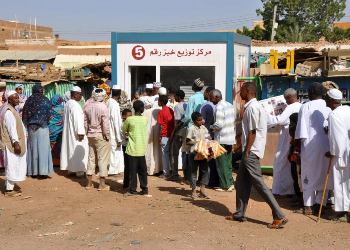Flour distribution resumes in Sudan after major mill returns to service
April 23, 2015 (KHARTOUM) – The head of the bakeries’ union in Khartoum state, Badr al-Din al-Galad, acknowledged flour shortages on Thursday, blaming technical problems caused by the suspension of the Sayga Flour mills, owned by prominent businessman Osama Daoud and covering 70% of Sudan’s consumption.
 These statements come at the heels of denials by other officials who accused agents and distributors of making up the crisis for their own benefit.
These statements come at the heels of denials by other officials who accused agents and distributors of making up the crisis for their own benefit.
Sudanese flour market is controlled by three major companies besides Sayga including Weta flour mills which is owned by Ibrahim Malik and the government-owned Seen flour mills.
Sudan imports more than two million tonnes of wheat annually at a cost of $1.5 billion dollars. The government plans for achieving self-sufficiency has failed since 1993 while domestic consumption have increased significantly.
Al-Galad said that distribution of flour to all bakeries has now resumed after Sayga Flour mills returned to service.
Last Friday, the state of Khartoum reached an agreement ending a dispute with major mills in the country after they refused to accept locally produced wheat on the grounds that it is of poor quality.
The deal will now allow mills to bake using 60% imported wheat and 40% locally produced wheat.
(ST)
